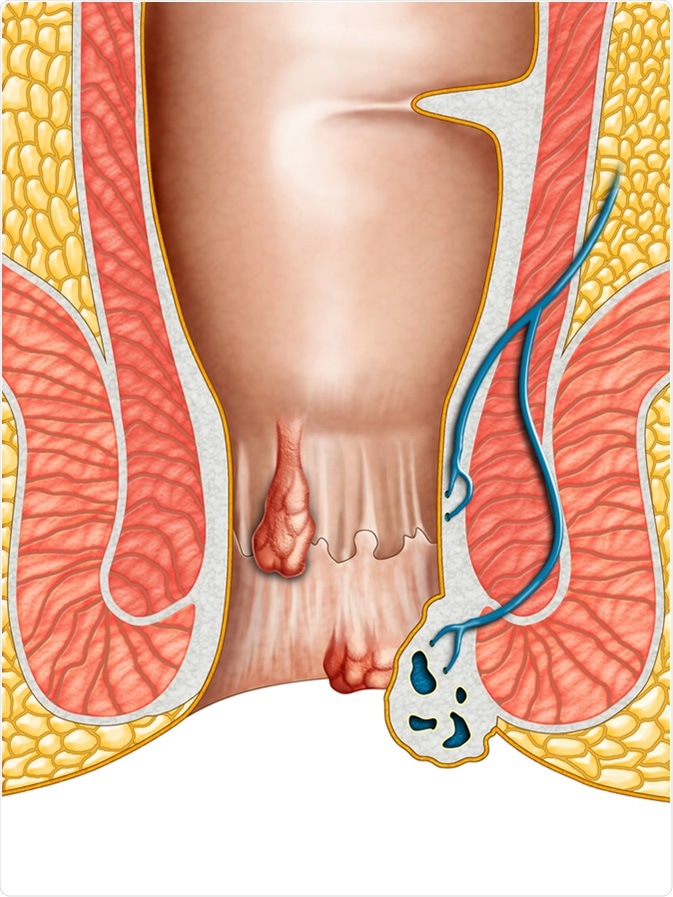Also referred to as hemorrhoids, piles are swollen veins that occur within the anal canal or around the anus. Piles may not cause symptoms and people can be unaware that they have them. However, they can lead to itching, burning, pain, bleeding and lumps that can be felt around the anus.
Piles can occur during pregnancy owing to hormonal changes that cause veins to relax and also increase the risk of constipation. Constipation can cause piles to develop as a result of straining during bowel movements. This can lead to bulging and protrusion of tissue in and around the anus.
A step-wise approach is often taken to preventing or treating piles that develop during pregnancy, and a combination of different measures are sometimes required to obtain full relief of symptoms.

Anatomical drawing showing internal and external hemorrhoids. Digital illustration. Image Credit: Andrea Danti / Shutterstock
Lifestyle Measures
Certain lifestyle measures can be taken to decrease the likelihood of constipation and therefore straining when passing a stool. These include the following:
- Maintaining a diet rich in fruit, vegetables and whole grain foods to ensure increased intake of fiber
- Passing stools in the morning and/or after eating, when the bowel is likely more active
- Ensuring sufficient intake of fluids, which is about 1.5 to 2 liters per day
- Engaging in regular physical activity
Many women also find that soaking the area in warm water can help to ease the paid associated with hemorroids. Additionally, it is recommended that affected women avoid sitting for long periods of time, as this can increase pressure on the veins in the area.
The Use of Laxatives
If lifestyle measures alone are not enough to prevent constipation, there are certain laxatives available that are considered safe for use during pregnancy. However, use should be limited to brief periods and medical supervision is required, since some laxatives are considered unsafe for use during pregnancy.
Treatment for Hemorrhoids
If hemorrhoids have developed during pregnancy, lifestyle changes and the use of laxatives may relieve symptoms.
If these measures are not effective, topical hemorrhoid treatments in the form of creams, ointments and suppositories may be used to provide short-term relief. Some of these treatments are available over the counter, while others require a prescription. The treatments are made up of various components, which may include antiseptics, local anesthetics, anti-inflammatories and lubricants. No hemorrhoid creams have actually been approved for use during pregnancy, but many are still recommended due to the low amount of active ingredients that are likely to reach the baby in the womb.
During development, a baby’s body and organs form during the first trimester of pregnancy and it is generally during this trimester that there is a known risk of certain medicines causing defects. Since hemorrhoids tend to develop after the first trimester, the use of hemorrhoid treatments after this period is not thought to increase the risk of birth defects.
Pain Relief
For some women, hemorrhoids during pregnancy can cause severe pain. In this case, women are generally advised to take paracetamol. Ibuprofen and other non-steroidal anti-inflammatory drugs are not recommended since they increase the risk of bleeding and can worsen hemorrhoids.
Further Reading
Last Updated: Feb 26, 2019